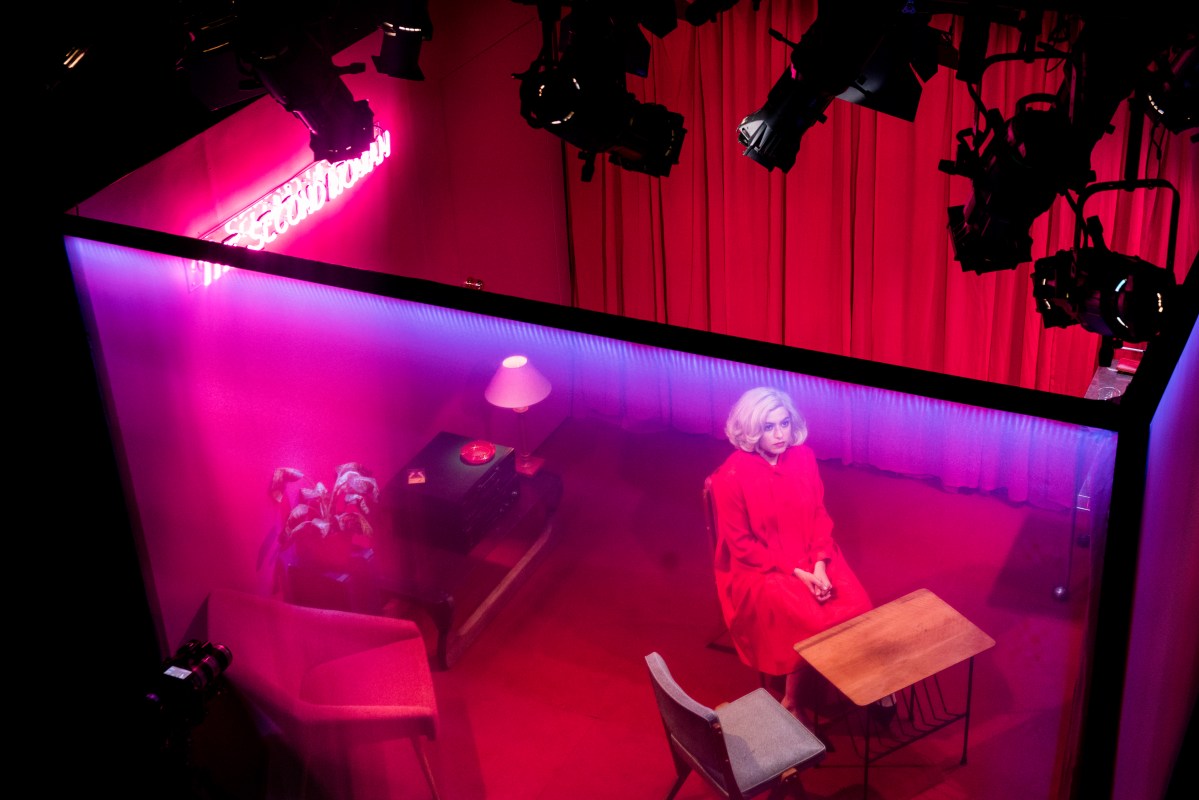The scene itself is simple enough: a man re-enters an apartment bearing Chinese takeout after a fight with a woman, they talk briefly about their relationship over drinks and noodles, the woman tosses said noodles onto him, they dance, and eventually she hands him $50 and asks him to leave.
What that scene became in the hands of Alia Shawkat (Arrested Development, Search Party) and the 100 different men she performed it with 100 times over the course of 24 hours this weekend, however, was a nuanced look at gender dynamics — and specifically, the variety of ways that men perform masculinity.
Written and directed by Anna Breckon and Nat Randall, The Second Woman drew its inspiration from John Cassavetes’s 1977 movie Opening Night and cast 100 local actors — mostly amateurs of varying skill level, along with a handful of professionals — to appear in a single scene alongside Shawkat. There was no rehearsal; she met each man for the first time the moment they walked through the door and onto the stage at the Brooklyn Academy of Music and began performing.
The actors were given some room for improvisation, with each ad-libbing their response to Shawkat’s character asking, “How are you? What are you thinking?” (One guy got a big laugh by responding “They told me I have four days to live,” but Shawkat, quick on her feet, got a bigger laugh and some applause when she countered with “Live where?”) But the most significant choice the men were faced with is the scene’s final line, when they must respond to being handed $50 and told to leave (a gender reversal of a trope common in pop culture: a man wanting to get rid of a woman).
They were told they could either respond “I love you” or “I never loved you” as they walked out, but that they should act it the way they would react in real life. Guessing how the scene would end based on how it was played each time was fascinating; the majority went with “I never loved you,” choosing to lash out and close themselves off instead of being vulnerable. One ad-libbed “you’re weak” and threw the cash in her face. Even some of the seemingly timid, sweet ones decided to neg her, and it was hard not to be reminded of how quickly some men can turn upon rejection. (Just ask any woman who uses dating apps how often she’s been called fat or ugly by a guy who was trying to get in her pants moments earlier.)
There were, of course, a few who chose “I love you.” One cried and took it a step further, saying “I’ve always loved you” as he walked away. Another changed the scene entirely, opting for “And I love you too” instead of the “And you love me” line that prompts Shawkat’s character to throw the Chinese food. Shawkat responded in kind, tossing the food playfully, instead of with anger.
Over the course of the 24 hours, it was interesting to see how audience reactions shifted. At the beginning, they were rapt and intense, sitting in silence between scenes as Shawkat carefully picked every last noodle off of the floor, placed the drinks back on the drink cart and threw the garbage into a wastebasket to reset. (Again, she did this 100 times. If I were her, I’d never want to eat lo mein again.) They would wince or tut at every “I never loved you.” One woman tapped me on the shoulder and whispered, “Why does she give him the money at the end?” There’s no quick-and-easy way to explain the gender dynamics of power in a relationship, and like any artwork, there is obviously a measure of interpretation involved here: “Cab fare, maybe,” I told her.
By hour 21 on Saturday, the crowd had fallen into the habit of applaudinng after each scene and then taking the opportunity to chat among themselves while Shawkat scooped up the spilled food, waiting for the next mediocre man to show up. The revolving door of actors had the effect of making them feel interchangeable. Shawkat, meanwhile, became a more empathetic figure with every version, as the audience learned more and more about her with every gesture and tic, even if the lines largely remained the same.
She showed no signs of exhaustion towards the end of her performance. If anything, she got more creative: each dance goofier than the one that came before (at one point she started scratching under her arms like an ape; at another, she climbed on top of the table), each fling of the noodles more aggressive (one poor guy ended up with a fistful tucked neatly behind the lenses of his glasses). We’d all laugh when she pulled a face every time an actor helped himself to the food without bothering to hand her a carton and chopsticks.
But after each rendition ended, the room snapped back to reality and turned away, leaving her to quite literally pick up the pieces by herself. As Shawkat told the Times after completing the feat, only one man out of 100 helped her clean up.
This article was featured in the InsideHook NY newsletter. Sign up now for more from all five boroughs.
























